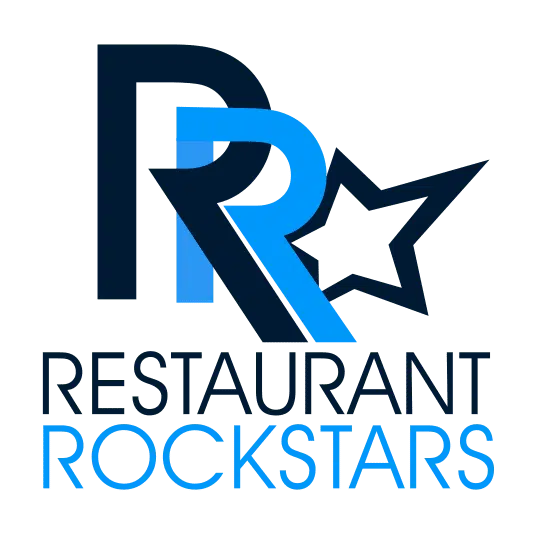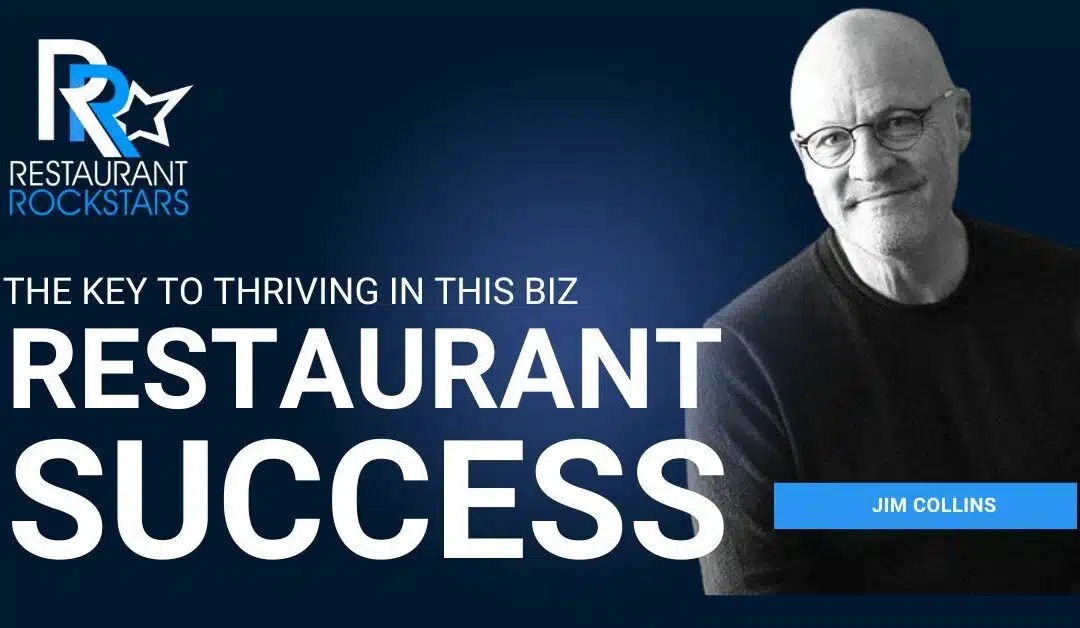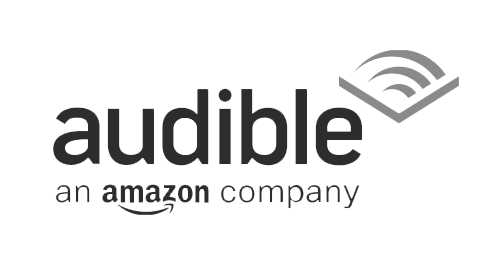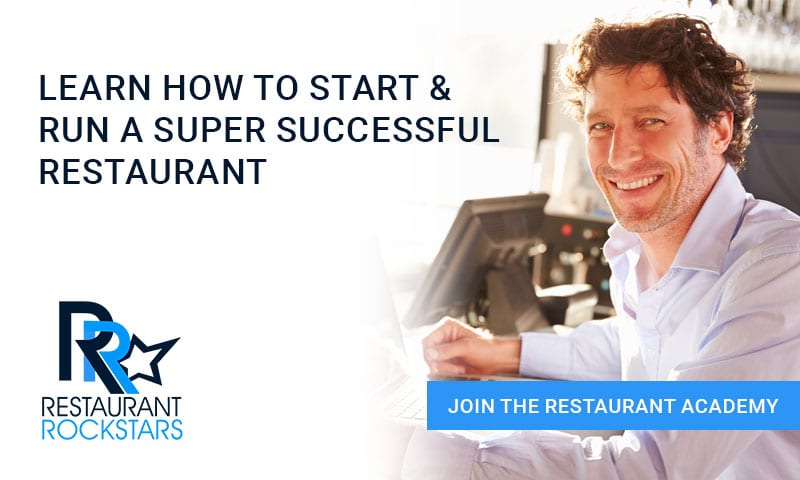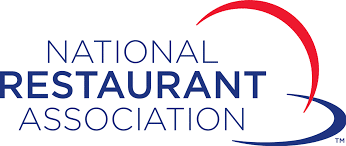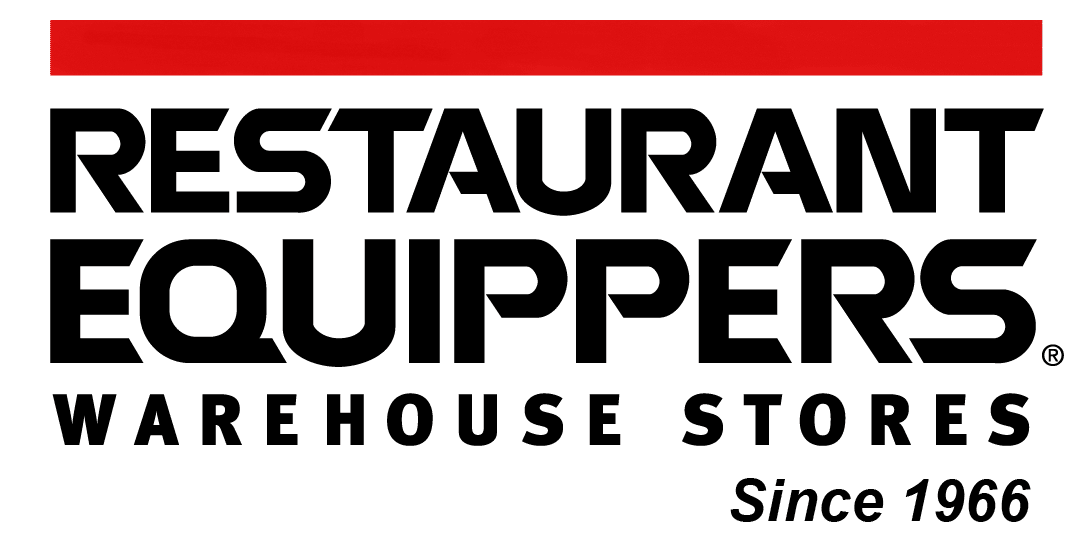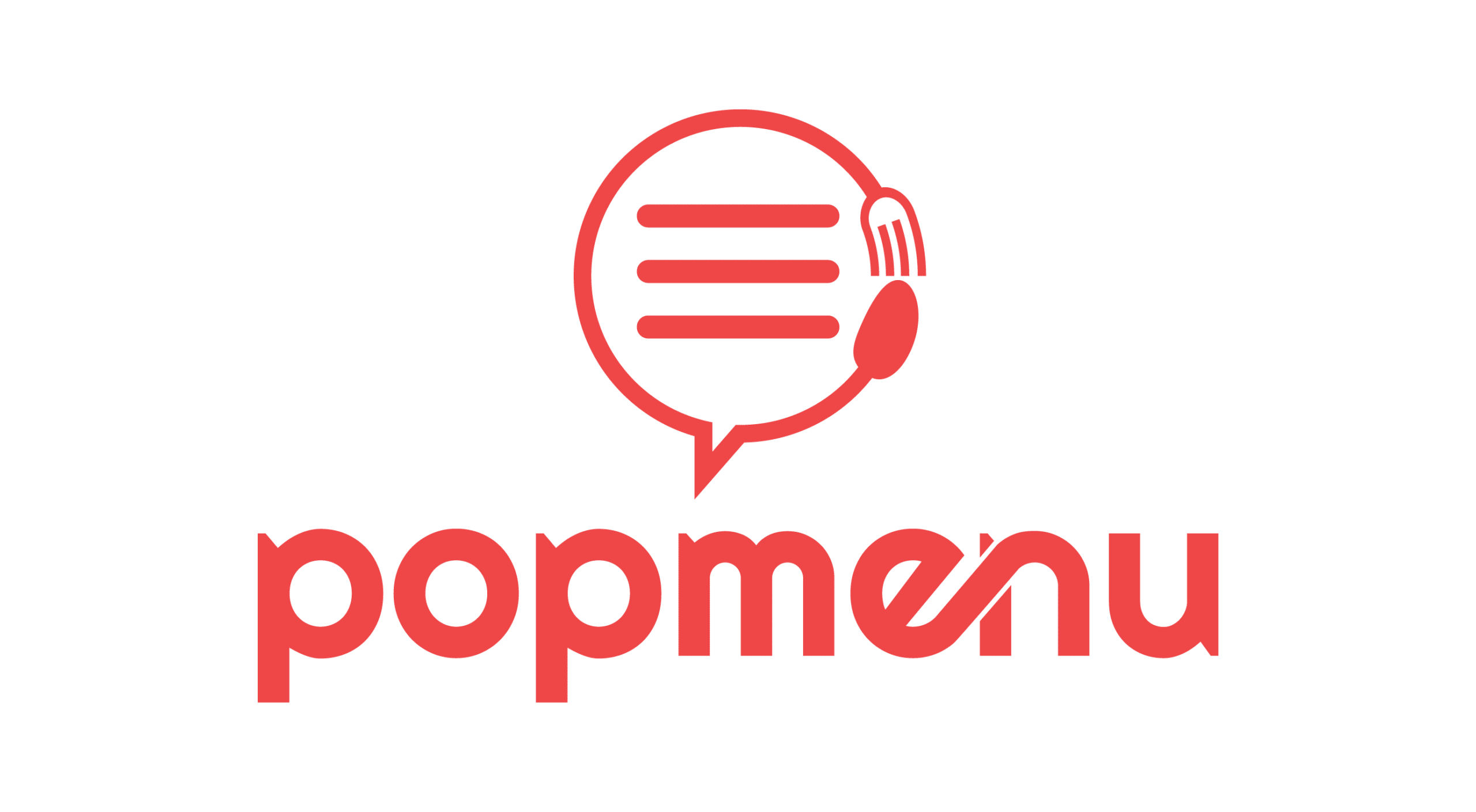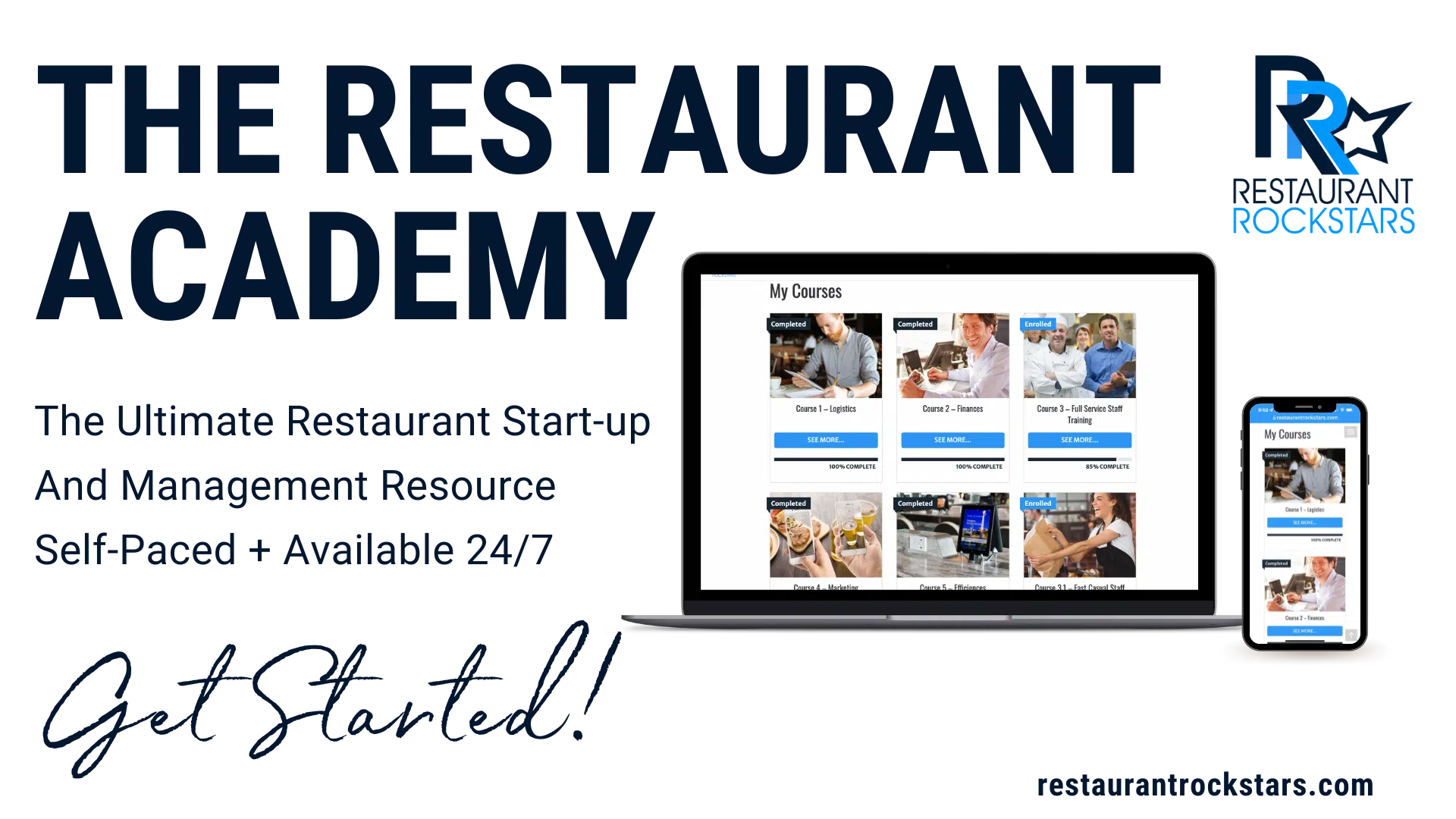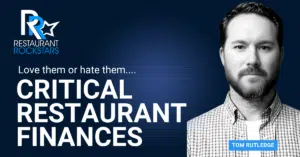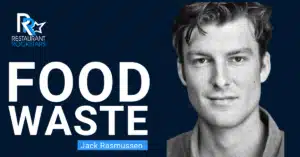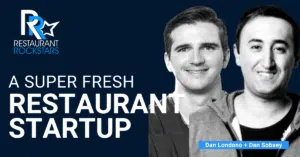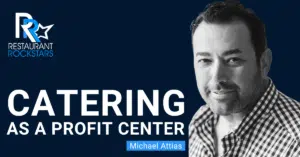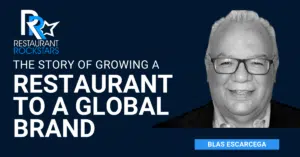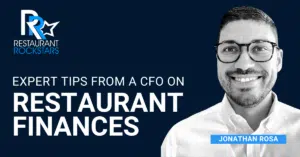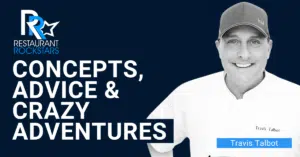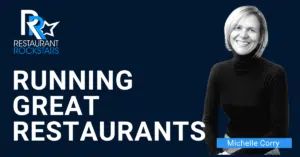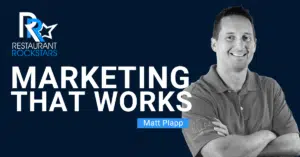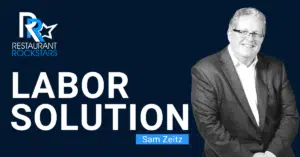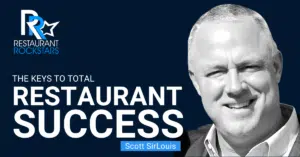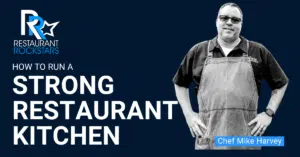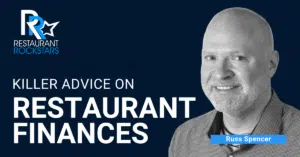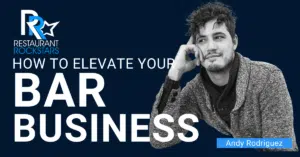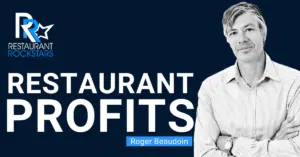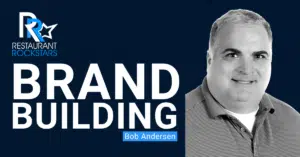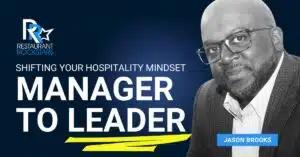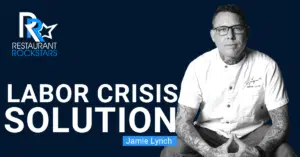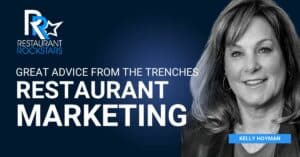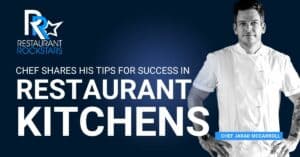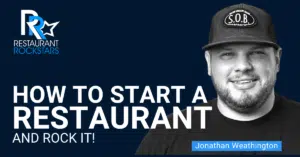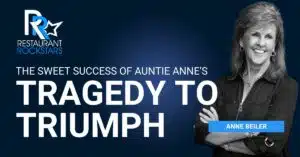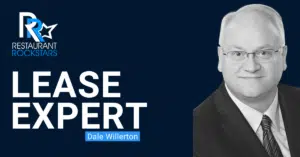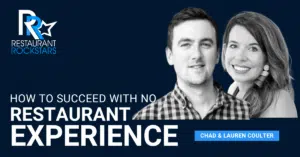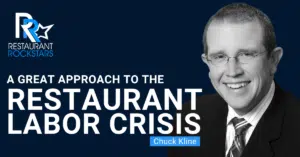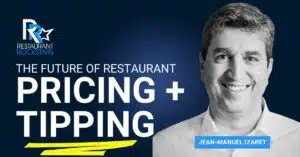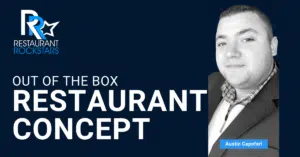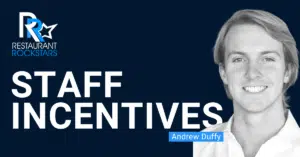Restaurant Rockstars Episode 385
Restaurant Success – The Key to Thriving in This Business
LISTEN HERE OR ON YOUR FAVORITE PODCAST PLAYER
In this episode of the Restaurant Rockstars Podcast, I’m speaking with Jim Collins, the owner of Town Kitchen and Grill in California.
Jim wasn’t born from the restaurant business, but he certainly has a way with achieving restaurant success and leading his employees to greatness!
Listen as Jim shares his restaurant successes, his failures and his philosophy including:
- Valuable lessons learned from his tech career that he applies to his restaurant daily.
- His passion of building a great restaurant and recognizing his people’s successes
- The true meaning of leadership
- Early restaurant experiments, failed ideas, and ultimate successes
- Necessary technology that fills seats
- The importance of knowing your restaurant numbers and tracking “kpi’s”
- The guest experience is what it’s all about
- If it’s not fun anymore, why do it?
Whether you’re running a single location or building a national chain, Jim’s approach on restaurant success is a model to be followed.
And his employees really love his free-meal policy!
Don’t miss this episode!
Listen, would you spend less than the cost of a fancy beer on boosting your restaurant profit?
That’s right for just $7, the Profit Maximizer course will show you proven ways to boost profit in your restaurant. Check it out – https://restaurantrockstars.com/sp/restaurant-profits and then go Rock YOUR Profits and YOUR Restaurant!
Roger
Connect with our guest:
IG OnwardJim
FB Townkitchenandgrill
IG Townkitchenandgrill
FB Personal 4jimcollins
Welcome back to the podcast. Thanks for being here. My guest today, Jim Collins, is the owner of a successful restaurant called Town Kitchen and Grill. He’s been at this about nine or ten years and we talk all about how he pivoted from corporate world as the CEO of a tech company and also involvement with virtual kitchens to owning his own restaurant.
His dream was much like ours. He saw an opportunity, he bought a restaurant that was failing, he turned it around, learned along the way, and we’re going to talk all about Challenges of running restaurants and the right moves and staying relevant.
We’re going to talk about onboarding a staff, building the dream team. This one has it all. You’re going to want to stay tuned. Thanks to our sponsors this week, and please head over to the show notes of this episode , we have a course that is called the Profit Maximizer.
It’s a way of running your business and it’s giving three very powerful ways to boost the profits in your restaurant. All for seven bucks. That’s right. Less than the cost of a craft beer, the Profit Maximizer. There’s a link in the show notes. Check it out. Now, on with the episode.
You’re tuned in to the Restaurant Rockstars Podcast. Powerful ideas to rock your restaurant. Here’s your host, Roger Beaudoin.
Listen, hospitality is constantly evolving. At the 2024 National Restaurant Association Show, you’ll find everything you need to plate up success for your operations. Whether you’re looking to satisfy shifting diner expectations, navigate razor thin margins, or capture data driven strategies to boost marketing or offset labor challenges, take it from me, the show has your missing ingredient.
See tomorrow’s ideas come to life and explore over 900 product categories from award winning food and beverage items to innovative back of house equipment and technology. Believe me, this show is huge. Visit the official show website at www. nationalrestaurantshow. com and register with promo code PODCAST24 to save 55 off the current show rate.
To stay on top of your business and ahead of what’s next in hospitality, it’s the biggest show for food service, only in Chicago, May 18 21. Promotional offer expires on May 16th.
Operators and managers, my restaurants were all about delivering experiences and creating memorable events. You might say we curated experiences that exceeded our guests expectations while we dominated the competition. We also had lots of big charge admission parties and live music shows. So let me tell you about TOCK, the industry’s first reservations platform.
TOCK provides tools and support that empower restaurant partners to thrive by adapting to changing times and guests tastes. Tak’s industry experience team take great pride in solving the toughest problems faced by your restaurant. From flexible reservations and a solution for no shows to curating memorable experiences, Tak provides your restaurant everything you need to bring your vision to life now and in the future.
With TOCK, you can showcase the best of your restaurant in one place. You can turn a table, a meal, or even a Tuesday night into an experience that you can sell and market on TOCK, driving revenue from every seat. TOCK customers rave about the support and commitment to hospitality that their guests experience.
Request a free demo today at joinTOCK.com/podcast.
Welcome back everyone to the Restaurant Rockstars podcast. So glad you’re here and Jim, welcome to the show. How are you today?
Hey, I’m doing great. Thanks so much.
Yeah, I’m really excited to have you here. . You are, , a very interesting person. You’ve got a varied career with one sort of consistent thread.
You’ve been maximizing revenues for small businesses. You’ve been involved in a lot of things, but we’re really interested in restaurants and hospitality. So tell us your journey. What’s your
restaurant story? Yeah, so, I’m one of those crazy people who Ran tech companies for years, as you said, all a common thread was companies that were focused on helping small businesses, compete in a, online and changing world and loved all that.
But sold one, I don’t know, gosh, 10, 11, 12 years ago now, and just decided that I was tired of never seeing my customers. When you run an internet company, your customers are always like, in the cloud, right? And so, you get notes from them, some good, some not so great. Some bloody horrible.
But you rarely get a chance to talk to them. And so, and I’ve always been intrigued by the restaurant business. Like a lot of people, I thought it would be fun someday to own my own. And then, for whatever reason, the combination of the crazy thought of how much, how cool it’d be to own my own and an opportunity to actually buy one and give it a go crossed and we bought town and here we are in our 10th year.
And. I, I’ve, it’s funny cause everybody always says, well, the restaurant business is so hard. Like, why, why did you choose to do that? And I always say, look, every single business I ever ran was hard. It’s just do you love it? And if you love it, then it’s okay.
You don’t mind the hard, as, or at least you don’t mind it as much. Trust me. There’s times you’ll mind it. But but yeah, it’s, I spent, 428 days straight at the restaurant when we first opened. And basically my wife was like, either, either take a day off or I’m divorcing you, and, uh, but she’s been a fabulous partner and we’ve had a great time with it and we love it.
And that sort of started my journey. And then of course there was, a whole bunch of other stuff along the way.
Well, that’s really inspired, and I’m gonna dig a little deeper in that in a moment, but you’re also involved at a high level in Ghost Kitchens, and is that all passed now?
Yeah, it is. I was in the very early days, early stages with kitchen United was recruited by the founders and some of the investors to come in and help them. Figure out how to turn, what was at that point really just an idea into a business.
And I honestly, I had a fantastic, a couple of years there working with the team and we really enjoyed that kind of seminal period in, trying to figure out like, how to like, we think this is a good idea. God, there was certainly a ton of people, diving in and spending zillions of dollars and all that kind of stuff.
And we thought it was a good idea. And, but it just, to me, my background in small business was always, we always focused on churn was like, always if I, if you’re selling something to small businesses and it’s useful. And it helps them, they’ll use it forever, right? But if you sell something to small businesses that, is either, annoying because it’s difficult to use or it’s, priced wrong.
So it’s more expensive than it feels like it should be or whatever. Absolutely. And small businesses don’t stick around. They don’t have time, they move on. Right. And so, what creates value for a company that’s trying to serve You know, what really basically is a rental or subscription model is customers who stick around, right?
No churn. And the biggest challenge that Ghost Kitchens had, and have, honestly, is a combination of extremely high development cost and the fact that the location of these places, has to be close enough to lots and lots of consumers to create enough business for what amounts to a whole herd of new restaurants moving into a neighborhood, right?
And so, we were trying different things and, it was fun. I gotta tell you, it was, there was a lot of scratching your head and, I remember the first time I went to a landlord and said, Yeah, we’re gonna put 10 restaurant kitchens in this building and the landlord was like, what?
He just, you’re, that’s just craziness, and I think at some point, I think the, I think what’s happening with that business model these days is they’re refining it still. And, obviously a lot of the early players, including my owner, gone at this point. But I think that’s natural when you see something really new, something completely different start, right?
It’s gotta, it’s gotta find the place that it serves to be a business that works. And I think eventually they’ll get there.
I was going to ask you if it was still a thing and you mostly answered that question. And then all these companies emerged that simply said, okay, you’ve got an existing restaurant, maybe you got some downtime, maybe you’re selling burritos, tacos, pizza, whatever it is, we’ll come up with 30 different brands and we’ll put it out on the internet and we’ll drive your business when you want it.
And you can shut it off when you want to do it and all that kind of stuff. And that sounded like, wow, I need business on Monday and Tuesday night. Did that model ever really work as it was described to work? Like I’m describing it to you.
Yeah. Like ghost kitchens. It’s funny I have a restaurant, and I was known in that world, and so there were, several of those people who came to me and pitched me on, doing virtual restaurant out of my restaurant, of course. The thing I always, I’ve always struggled with, was, this it’s it’s one of those things, it’s so simple, it’s like, why didn’t I think of that before, but when people are hungry, they’re hungry, and when they’re not hungry, they’re not hungry, right?
And so, if you want to plug a virtual restaurant into a restaurant kitchen, right, then the restaurant kitchen can’t be busy when people are hungry. Well, what’s a restaurant that’s not busy when people are hungry, right? That’s called a failing restaurant, right? And so in some cases, virtual restaurant brands could create a bridge for somebody, who, for whatever reason, their concept didn’t work.
But the problem was you got a brick and mortar restaurant, right? So you’re paying rent for brick and mortar, retail space. That’s a certain amount of room, a certain amount of people, a certain amount of rent, all that stuff. Yeah. Fixed investment there. Yeah. As much as everybody wanted to talk about how fast and how huge the to go business was and how big it was, and, these companies have a, billion dollar valuations and, whatever.
Right. What percent of the total restaurant marketplace does delivery make up today? And the fact is, if you exclude pizza, which was honestly, I’m pretty sure, already doing delivery before all the delivery stuff happened, right? That was the first to
start
delivery, for sure. Yeah, if you exclude pizza, you’re still, actually, the last time I looked at the numbers, we were still sub 10%, right?
And so, if I’m going to try to keep my restaurant open doing just delivery on virtual brands and I’m going to do, I’m going to sell through that channel, I got to try to figure out how to get, the other 90 percent of the business I need to keep my business open coming in my door.
Well, guess what I have to do that? I got to figure out how to have a successful restaurant, right? And so, as soon as my restaurant’s successful, I don’t have room to do the other stuff anymore, so I think there’s a few of those concepts that actually have worked really well. Wow bow comes to mind, right?
With the, cause that’s such a small footprint product that’s really well known to the consumer base, right? And so, that was something that you could tuck in the corner of the kitchen and, make hay with, but other things that were, disruptive to the, your make lines.
I’m sorry, but I’m not going to not make my town kitchen chicken sandwich because I’ve, somebody wants me to make a, whatever weird brand you came up with, chicken sandwich for, and sell it to you for six bucks,
so absolutely. Right. Yeah. I mean, trends come and go and some things have legs and stay, some don’t, and that’s evolution and that’s free enterprise and all those things.
And who knows where things will go and all the crazy ideas people have and some stick and some don’t. That’s all
well and good. Yeah, I think, it puts me in the wayback machine, but one of my favorite phrases early on in business was, came from Peter Drucker, right? Yeah.
And Drucker said, a new idea is almost never The ultimate formula for success, right? The success comes from the constant revision and refinement of that idea, right? And if you’re not, and if you’re an executive and you’re driving a company and you’re trying to serve a marketplace, if you’re not looking out the window, trying to figure out what the consumer’s really after, then you’re going to fail.
And and I think what’s happening is that’s happening, right? People are looking out the window, they’re refining, the models are changing dramatically, right? But I think ultimately some of these things are going to work. And who knows? The internet did.
I think you’re hitting on a key point.
We’re talking about staying relevant. And we can tell stories all day about restaurants that are around for 30, 40, 50 years that are gone because they’re You know, their target market aged out. They didn’t stay up with younger generations and now that the business is toast and that’s just, that’s a really sad thing.
So one, stay relevant with your consumer and then also keep an eye on what the competition is doing. Play your best game, but know what they’re doing. And you gotta, it’s like guerrilla warfare out there, you can’t just sit back and say, I got a successful restaurant. I’m always going to be successful.
That’s peril
waiting to happen. Yeah. And that’s true. It’s funny. It’s true in any business, right? Yeah. Another one of my sort of things is that, if you’re going to run a business, you got to keep your raft in the middle of the river, right? I know it’s tempting to Eddie out.
You want to pull your raft over and sit in the still water by the shore and, put your feet up and let the river go by. Right? Huh. Sure. You do that for 10 minutes. All the work you did to get ahead on the river, it’s, the river’s past you now, right? Yeah, the current keeps moving. That’s it.
You gotta stay out there in the middle of the stream. You gotta keep pulling. And honestly, I get it. It takes passion. I know why those restaurants we have a, there’s a great restaurant down the street that just closed its doors a couple, weeks ago here that’s been in business for 30 years.
It’s exactly what you’re describing, sad, isn’t it? And it is. It’s really sad. It’s heartbreaking. I actually I hired one of their servers and she was telling me that they hadn’t changed the menu in, literally 10 years. The only thing that they’d changed was the prices.
And she’s no, that people want healthier options now. They want, whatever they want. We gotta do that, it’s fun because she had passion, but you know, the
owner was tired. It’s like common sense would dictate you don’t fix what isn’t broken, but you fix what is broken.
Right. Wow. And there’s always, in a restaurant, there’s always something broken, let’s face it.
Perfect time. Let’s talk about town. I think I heard you say you purchased town, kitchen, and grill. So was it a longstanding concept? What is the concept? Tell us a story there.
Yeah, so it was a, it was just what we were just describing.
It was an Italian restaurant. With a name that’s almost indescribably long, I’m not going to try to tell you what the name of the restaurant was, but it was an Italian restaurant that had been in business for a few years that was just failing, not doing well. I knew the owner he was frustrated he’s a very successful restaurateur, actually had a, he had a very successful restaurant in, outside of London of all places.
And but this, for whatever reason, his concept just didn’t work here. So I ended up buying basically, when I say I bought the restaurant, I bought the build out and the liquor license. I probably paid, 30 percent more than I should have because I was green and I didn’t know, back then I didn’t know what I was doing.
But, we, I came, I knew exactly what we needed to do. I, we’ve, I’ve lived in this community for 20 years. Longer than that, but I’m not going to say how long earlier but I knew what it was missing, and what it was missing was a restaurant where people could eat great food, have a great cocktail, be served really well and, feel super comfortable coming in with the kids on a Tuesday night for a pizza.
We’re coming in dressed up to go out on a Saturday night and having a great steak, right? And so, but I wanted a narrow menu, honestly took a lot of inspiration and I don’t want to say necessarily guidance, but a lot of inspiration and, of How successful restaurants work from, Hillstone operations.
I’ve always had a lot of respect for, Houston’s and, the other concepts that they have, these are spaces that are incredibly profitable, incredibly busy. Have narrow menus, very high focus on service and and efficiency in serving our customers. And so we just I built the menu.
I’d been cooking for years. And so, I built the menu. I hired I hired my first chef. And fought with him and fought with him and fought with him, over the course of about a year until I fired him and hired another chef. And I can tell you stories like
that, too. It goes with the biz. Of course.
Yeah,
of course. And yeah, but after, the lucky thing is, nine years in, we have a fantastic team. I’ve got a great chef. My, I love, it’s funny people say, well, what do you like about the restaurant business? I’m like, I love everything about it. I love cooking in my kitchen. I love, I don’t even mind cleaning the bathroom.
You know what I mean? To me, it’s all hospitality. It’s all, It is hospitality. Thank you for mentioning that. Right? It’s when a guest walks in the door, you want them to just take a deep breath and go, Ah, you know I’m here, right? I’m good. I’m, everything’s gonna be fine. And, And the great stories you hear and just, that’s, I love all that stuff.
That’s a beautiful idea. So I’m getting the fact that it’s come as you are, family casual, something for everybody, but it’s like you, you read the pulse of the market, you knew what they wanted, you knew what the community would respond to, and you delivered that. Yeah. And now you’ve got regulars and you’ve got loyal followers and you’ve got online reviews and all this kind of stuff.
And when that happens, then that creates a culture. It’s not just a restaurant. It sounds like you’re running a business. You’re not running a restaurant. Your team are engaged and they enjoy meeting new guests and making friends with guests. And they’ve, and you’ve got longevity, I’m guessing, right?
Have you had any labor challenges or you’ve got a really solid team and you’ve built a culture, they respect you. It’s you’re a leader, you’re not a boss, you’re not barking orders. It’s is that what I’m, is that what I’m
experiencing? Yeah it’s honestly, that’s pretty true. We have very low turnover in the restaurant front and back.
I pay people well and definitely, let’s face it, that helps, especially in the kitchen, our servers make really good money here, but we make sure the guys in the kitchen are comfortable and happy and that they know that they’re respected there’s every single person who works at Town knows every single other person who works at Town, they know their names.
I have two, I actually have two new people in the kitchen because two of my long time crew moved home and two, one of them only speaks Spanish. And it drives me bananas that I can’t speak to her in her native language, and so I started learning to speak Spanish two months ago so that I can talk to my team.
That
speaks volumes about how you approach the business and how you care and how you want to be part of the team. And that’s a beautiful thing. And how fulfilling is that for you to master a new language? And now you’re in the kitchen communicating with the Spanish speaking folks and, oh, that’s, I love that.
Thank you
for sharing. Trust me. I say to her, I say, What you said, and she’s, and she laughs and then she just spits it all out at me again, and we’re figuring it out. And I think that’s part of
it. Let’s go back nine or 10 years ago when you first got this idea, Hey, I really wanna be in the restaurant business. And that might, it might be a lot of fun.
Let’s see what we’re gonna get into. Yeah. What were the early challenges? Do you remember any real. Real, hardships or really things that you said, why did I do this? And how did you overcome those? What can you tell us about that? Cause there’s a lot of people, there’s a lot of people post pandemic that have been through the war, as and they’re still standing.
And now it’s do I still have the passion for this business? Am I still tied to it? Am I missing my kids grow up? It’s I’m trapped. But they don’t have systems in place. They’re not figuring out how to run a business. And if they did, they could free their time and they can empower their staff.
But let’s go back to you putting yourself in these people’s shoes. But what you first overcame when you got into this business, you had a long list of things you needed to do to turn that Italian place into your idea of what the people wanted, right? And some of those things probably worked and some didn’t work.
Take us there.
Rockstars, this year, give your team the gift of PopMenu AI Answering, a simple solution for phones ringing off the hook. AI Answering handles calls 24 7, 365 days a year, so your staff can focus on in person guests.
Customize your greetings and responses. Answer common questions. promote specials and events, and send follow up links to ordering and reservations. AI answering handles it all, while escalating more complex conversations back to your team. Now, never miss another tasty revenue opportunity. PopMenu is the marketing technology platform designed to make growing your restaurant easy.
Discover more AI restaurant tools that turn your to do list into an already done list. Request a demo today and my listeners for a limited time will get 100 off their first month, plus lock in one unchanging monthly rate. Go now to popmenu.com/rockstars. Again, get 100 off your first month at popmenu.com/rockstars.
Rockstars, when I needed equipment for my former restaurants, I called Restaurant Equippers. Restaurant Equippers has served independent food service operators just like you going on 60 years. You’ll find all the top names and extensive inventory at their huge warehouse stores in Ohio, Michigan, and New Jersey.
You can shop Equippers. com or call their National Order Office at 800 235 3325. Their experienced specialists will help you get the best equipment and supplies and save you money. Thousands of name brand products are available for immediate store pickup or shipment. Just like me, when you need something, you need it now.
Restaurant Equippers will make sure you get the equipment and supplies you need, when you need them, at a price you want to pay. They shop the world to find the best products and value. Give Restaurant Equippers a call for all your equipment and supply needs or check their website, equippers. com.
That’s funny to think about that. I was, we just recently opened for a new day park cause we’ve always only been dinner and all of a sudden to me, there was an opportunity to do lunch. And it’s been fun to be starting a new business within the business, but that’s a good example of letting the place evolve.
But it caused me to think back, to January 1st of 19 sorry, of 2014 or whenever it was that we. We took the restaurant over. It was January 1st of 2014 and They had, the previous owner had two POS systems because One POS system he only used for time clock, and then the other POS system he used for all his ordering and everything.
And I was like, what? I don’t understand, because you can Use this one that you’re using for time clock. You can do everything on it. And he was like, yeah, but it’s internet based. And the employees are going to be able to look and see how much money I’m making. And then they’re going to want more money.
That was the explanation. And and I was like, that doesn’t sound right to me. So I de installed the old POS, not going to name any names here. I de installed the old POS and focused on the new POS, which was an Android based. Solution, but it was one of the early ones. And honestly it all worked fine.
That was, I got it all up and working. But one of my early big challenges was I came out of tech. And when I dove into this, I thought, Oh, well, they’ll have online help and I’ll be able to go, just download, how to articles and, whatever. And they didn’t have anything.
And their tech support was terrible. And so there was a lot of early, there was a lot of trying to figure out how to make it work. Right. And so,
sorry, it’s funny. I touched my earbud and now Siri’s trying to help me with something, which is just crazy annoying. So just to prove how techie I am, exactly. Right. So, but I think the biggest challenges honestly were sticking to my guns. Right. It was, when you do something new, Every single person who comes in the restaurant says, you know what you ought to do.
And they’ve all got, they all have this advice that I’m not asking for, and the thing of going home at night, cause there’s days we’d be really busy one, one week, and then the next week we wouldn’t be busy. And I’d be like, Oh no, no one loves us anymore. Right.
I didn’t get that. You just write it out. The next, if you’re not, nowadays, it’s if I’m not busy tonight, I’ll be busy tomorrow night. It’s okay. You can feel that way after 10 years, but you don’t feel that way the first couple of years. So it’s, it is very draining. Right.
And I think the biggest advice, cause I do, I talk to new restaurateurs a lot, and the advice I always give them is you’ve got to be there, you got to be out front. You got to listen to the customer who says this dish was bland, right? You got to listen to the customer who said you should have seven more beers, right?
Trust me, you get seven more beers, you’re going to have to get seven more beers, and then you get seven more beers, and then the next thing you know, you got 241 beers, and you still need seven more, right? So, some of those original ideas are the right idea and you just got to stick with them, but some of them are not, and you got to think about it, weigh it, right, and then make your decision and move on.
And so, it’s that same thing. Sometimes you feel like you’re in the rapids, in the whitewater. A lot of my analogies are obviously rafting, right? Sometimes you feel like you’re out there in the whitewater getting tossed around, and then sometimes you feel like, Jesus, are we ever going to see any whitewater again?
Like, when’s the next time I’m going to be busy,
right? They got to dodge all the rocks in the road too, right? At the same time. And they’re coming in like asteroids, right? And you got to pivot and you got to steer and you got to shift. You got to look ahead. Yeah, totally.
And these days, honestly, I think it’s funny because probably over the course of the last Three and a half years since COVID is when we really started making progress and making the business was always marginally successful.
We, we made enough money to pay the bills. We made a little money. It was working, for those first Seven and a half years, right? And then COVID. Wow. What? Been there. Right? Exactly. And so, we did the thing with town where we pivoted and we were we turned ourselves into a little grocery store, and
people got.
Similar story. I’m not going to steal your thunder, but I sold all my restaurants in 2014. And then late in 2019, I bought another restaurant. Hello. Same thing, rip all the seats out because the state shut us down, turn it into grab and go. Tell us, yeah, so you did the same. Yeah
we I just basically piled all the seats up in the corner but, we, we did we, people could order California was great because they were one of the first states to do online cocktail sales, for restaurants.
Yeah, that was great. And so, we would get these fun orders. I still have a few of the chips around somewhere that would be like. Yeah, I want short rib and a mixed green salad and a bag of toilet paper and flour and four old fashions to go, awesome. Awesome. And
And it was Yeah, we’ll sell you everything we got, the kitty litter, the greeting cards, and the french baguettes, and the cheese, and the beer six pack to go.
It’s here it is, here, you need this?
Yeah, it’s I think my epiphany moment was like Awesome. Going to my grocery store and the egg thing is empty at the grocery store and then that same morning running out to restaurant depot for something at the restaurant and seeing this giant wall of crates of eggs because all the restaurants are shut down and they can’t sell them, and so I literally that day went and bought like two crates of eggs and four crates of toilet paper and you know all this yeah wholesale pack stuff and brought it back to the restaurant and sold it but yeah.
Resourceful, creative.
Yeah, I think what COVID made us do is it made us start thinking about our businesses differently, right? So all of a sudden we weren’t just like a restaurant. We were a different kind of business entirely. And for us, that, that really opened the door to start thinking about, like, how do we change the underlying technical sort of framework of the restaurant to make that work for us, right?
Because up to that point, we literally were just using the systems that were here when we bought it, and I had always struggled, and here I’m going to name a name, right? I’d always struggled with, I paid Open Table an average of between 1, 400 and 1, 800 a month for reservations. And I knew, personally, I knew 60 70 percent of the people who walked in my front door.
And I would sit there and think, why am I paying for these people to make a reservation? And all of a sudden it dawned on me, it’s because they’re all using the app to make the reservation. Because that’s what they’ve been taught to do, right? Well, how did they find that app in the first place?
Well, they found it through us or through some other restaurant, right? And, so is that, was that customer looking for us, was the customer going online and searching, Hey, I want to go out to dinner tonight nearby, right? And then finding a the list of open table restaurants and saying, Okay oh, this, here’s a good looking.
No, they were going online and saying town, right? And then clicking the reservation link in my town banner. That took them to the, to open table. Right? 1200 bucks a month, 1400 bucks. That’s a lot of money, right? Oh, it sure is in a restaurant, right? Oh, it absolutely is. Wow. And we had the good fortune because of my connections at Kitchen United.
We, we actually got to know the Google Restaurant team pretty well in the process of all that. It was a, that was neat. It was a neat time. ’cause I got to meet all these people who actually make a difference in our world, right? And so one day I said, I have this feeling that. 80 percent of people who are searching for a restaurant search for a specific restaurant.
They’re not searching for dinner nearby and then looking through a whole, you do that if you’re like on a trip, or whatever. But if you’re home, you know the name of the restaurant, you just don’t know, where its link is. So how do you find it? Guess what we learned? Maps.
People go on maps, they do search nearby because that’s, they think that’s the easiest, I saw that restaurant in Montrose, I was like, oh, that’s its town, right? They click on the link on maps, and that takes them to a restaurant reservation, they make the reservation and go, right? Well, restaurants shouldn’t be paying, they shouldn’t be paying more than just a nominal service charge for that reservation, right?
And it was, I gotta tell you, it was super scary to make the leap because I was getting all these emails that were like, Oh, you’re gonna lose all this business when you go, it’s gonna. Your business is going to die. And but we were just, we were. Convicted that if we did this it would be the right thing.
We jumped, we chose talk, we jumped to TOCK, and it’s been fantastic. We literally never missed a beat on reservations. My monthly fees went from, It’s 1, 400 to less than 200 or over 200. I don’t know, they’ll yell at me for telling you it’s the wrong amount, but it’s trust, it’s, I save a ton of money and the cool thing, I think the other neat thing that, and the reason we chose that platform, like the reason we chose Toast when we moved off of our original POS we knew it was going to push us.
It was going to give us new ideas, right? TOCK was a platform that, for God’s sakes, came out of Alinea, right? You want to talk about something that’s dramatically different than town. Parents aren’t bringing their kids in their PJs to Alinea, on a Wednesday night for pizza, right?
But this whole concept of, like, how do I market my restaurant in new and different ways to my customers, right? that are going to be fun for them, and so we came up with this idea of, you market an experience called You know, friends night out. I’m old fashioned, so I was going to call it girls night out or guys night out.
But luckily I got smart people around me and they were like no. We call this friends night out now. And
that’s, and so anything, anybody,
sure. Yeah. And so it’s like a friends night out experience is like a eight, a party of eight and we serve family style and it comes with, cocktails.
And, but we get to, you tell us what your food allergies are and stuff like that, and we get to plan a fun meal for you. And we’ll put it on your table and you can, come in with your buddies and just laugh and talk and you can do it outside on our outside dining area. You can do it in the dining room.
And what it does is, even though you don’t get a zillion bookings for Friends Night Out, It gives you another thing that’s relevant that you can talk to your customers about, like another connection point, right? Then they may not go, oh yeah, let’s do Friends Night Out, but they’ll go, oh yeah, let’s go to town tonight, like I’d forgotten about that place, let’s go on, let’s go back there, are
you doing more than the Friends Night Out experience? Cause now we’re talking about curating an experience that’s a special promotion that attracts the attention of your guest. And they say, Hey, that sounds like fun. Let’s try that. And you can market it on the platform as well.
Yeah, so that, so in the beginning, we were, it was, we were a little stuck with it because back when we first started, if you set up tables as an experience, then you couldn’t give those tables to reservations.
And for town, that was hard, so we were pretty limited. Recently TOCK gave us the ability to do what’s called a multi experience tables, where they literally, if they’re not booked for an experience and a reservation wants to come in, they give you the table for a reservation.
That’s worked incredibly well for us. So that’s versatility and flexibility. Exactly. But the cool thing is it’s opened the door for us to market now birthday parties. Yeah. Right? I mean, what a basic thing, right? Duh, but so what’s a birthday party, right? A birthday party is, you tell us, is it a child’s birthday?
Is it an adult’s birthday? You set up what you want to come in for. We’re about to launch this. So, we’ll see. But that was fingers crossed, by the way. But the birthday party is, you get to tell us like, what’s your favorite cocktail and, a couple of other things like that.
And then whoever’s birthday it is can come in and, radio button, this is what they want for their menu. And, again, it’s like family style and, You get the table for, this period of time and then we don’t bake much around here but there’s a great bakery literally right behind us and so we’ll get you one of these super cool birthday cakes from this bakery and you can, that becomes the pièce de résistance in your birthday party.
And so we email out to our guests and say, hey, is this interesting? Do you think this would be fun? And the great thing is they’re super active they email us back and say, yeah, we love that idea, and and so we’re thinking about that, we’re thinking about doing some, not, we don’t want to do big wine tasting dinners wine dinners are very difficult for small restaurants because our kitchens aren’t set up for banquet style, dining.
I hear you. But if you want to come in with 80 of your friends and have a dinner that’s a bourbon tasting, or a cocktail tasting, or a wine tasting, or whatever then we would love for you to do that on a Sunday through Wednesday night when I know I’m going to have eight seats available for you, right?
And so I think switching technologies, even though it was super scary, that’s what really pushed us to start thinking about some of these new things. And I think that’s what’s keeping us or will keep us relevant. Oh, yeah. You know in our community for at least the next two years. I don’t know, three months, and then we’ll have to think of something else.
Are
you taking reservations every night? Are you busy every night where you need to? And then, yeah, so we,
yeah, go ahead. So we, Sunday through Thursday, we’re probably 40 percent reservation, 60 percent walk in. And then Friday, Saturday, we’re probably 80 percent reservation, 20 percent walk in. Gotcha. And we have about a hundred and the restaurant has about 120 seats.
So it’s medium sized. Dining room in, on an average weeknight, we’ll do, call it 155 covers, something like that. And on weekends, it’s not unusual at all for us to do, well over 200.
So you’re using TOCK for reservations, and you’ve already given us some benefits there. What about no shows?
My restaurant’s never, Never took reservations. It was always first come, first serve, but now most restaurants do. But the biggest problem, of course, is, somebody makes a reservation. Yeah, tell us how do you handle that? Like, how does that work?
Yeah, it’s two things. This is going to be somewhat funny. Most nights I don’t care. You don’t, you make your reservation, you don’t come in, I’m going to have a part, a walk in party that’s going to take that table. Okay, perfect. And the, and again, it’s easy for us to manage that if somebody doesn’t show up, A, I’m not paying for the reservation anymore and, so it doesn’t, like it’s not an out of pocket cost, it’s just an opportunity cost that’s filled by the fact that we’re in a busy community, right?
Yes. Yes. You know when I care? Mother’s Day. And I care on, Biggest
holiday of the year for restaurants, it’s
huge. Yeah, Valentine’s Day, Mother’s Day, Christmas Eve. Last year before, the year before last, before we went to TOCK because we went to TOCK mid year last year, Christmas Eve, I had a party of 12 that no-showed.
I called the guy, I knew, I actually knew the guy, I called him the next day, I said, what happened, he said, oh yeah, we were just tired, so, I’m like, No
courtesy to call you. Nope,
it never occurred to him, wow. But I said, look, the challenge, dude, is, People are not out walking up and down the street looking for a place to have dinner on Christmas Eve.
They’ve made arrangements, right? Yes, they have their plans. That’s right. Yeah, and so on those nights, we just, that would just kill us. And now, if you want to make a reservation for a party over four on, we choose the days, then you have to give us a credit card, to verify that, that reservation, and we’ll charge you if you no show.
Right? So if you call us, at the last minute and say, yes, Hey, I’m not going to be able to make it. I might have somebody who called earlier. I’ll call them and see if I can fill it. No problem. But if you just no show, I’m going to charge you. So, and we never had the ability to do that before.
So that’s how we use that. Okay. There’s a lot of places. There’s a lot of people I know of that. They have, their restaurant concepts are so popular that they can actually charge the customer for the reservation when they make the reservation, right? And so they literally sell like a, seven course dining experience for 400 bucks, but we’re not that.
So, but this other thing works for us. That’s good.
And you can also, well, you can sell event tickets in advance, like you’re talking about. My place did rock bands every weekend. Yeah. And then we had big parties, like New
Year’s Eve. I want to come to your place, man. That sounds like fun.
And we always, we had that challenge of we’d want to sell tickets in advance, as opposed to slowing things down on the night of the event when people are coming in.
And we tried to do that, but back then, I mean, I wasn’t aware of TOCK if TOCK was even available 10, 12, 15 years ago. So it’s old school, technology keeps moving forward and it makes things more efficient and provides solutions that really make your business more profitable. So I’m glad you
shared.
Yeah, and restaurateurs are, every restaurateur I know is scared to death of changing out their technology, I know. There’s a, literally there’s a restaurant two doors down the street that it’s had the same POS system for, since they opened 20 years ago, and he comes in, the man, the owner manager comes in, he looks at our, because we went, we switched from our old POS to Toast, and is it laborious?
Yes. Is it somewhat scary? It’s scary. Yes. Are you gonna mess something up? Yes. I clicked one wrong radio button and for a month I didn’t collect sales tax from my customers. What a moron, right? 8 percent bummer. Yeah, that’s don’t do that.
That’s a hard pill to swallow, huh?
But it was totally a hundred percent my fault, if I had just bothered to read the little thing next to the radio button that said this will cause you to have to pay the sales tax, then I would have known that’s what was happening. And luckily a customer came up to me and said, how come there’s no sales tax on my check?
And I was like, oh,
You’re lucky that guy pointed that out to you, because how much longer could it have gone on? So the damage control
right there. Yeah, my customers are fantastic and clearly smarter than me, right? But but the fact is, right? What, the reason we switched to Toast was we get a lot of, Pickup orders.
We don’t get a lot of delivery orders up here, but we get a lot of pickup orders. And we were having to manage taking those pickup orders out of our system that allowed people to order online and then typing them into the POS, right. And then firing them into the kitchen and no coordination between the wait times on the, delivery platform and the wait times.
The fact that the restaurant crazy busy right now. So I need an extra 15 minutes to get your order ready or whatever. And the first week we went to Toast, we switched on, Toast online ordering, and the, I remember the first time I saw a customer order flow into the kitchen, we were busy, we probably had, we used tickets, we’re old, whatever, we don’t have KDS, but we had, I had this giant rail full of, receipts, And or tickets and this online order comes in.
It’s like this long with no modifiers. And I’m like, Oh boy, here we go. But I look at it and sure enough, the timing on the online order has been. corrected by the fact that the system knew we had a bunch of stuff working in the kitchen. So it’s got the right time on it. I didn’t even have to call the customer to say, Hey, give us an extra 10 minutes before you come in.
We have the order ready. And so it was literally like this epiphany moment when, you slap yourself in the head and go, why didn’t I do this two years ago, or whatever. But Yeah, it’s, I think the, what’s the common theme, right? The common theme is for restaurants, if you cannot be still in any facet of your business.
You have to keep your technology evolving, right? You have to keep your menu evolving. You’ve got to, be listening to what’s going on in, consumer trends. And, don’t try to turn yourself into a vegetarian restaurant if you’re not a vegetarian. That’s not your passion. But make sure that you’ve got some vegetarian items that are really tasty that vegetarians will like when they come to your restaurant, right?
And, it’s just a bunch of stuff like that. And and if you’re tired and you feel Like you just don’t want to do it anymore and, blah, blah, blah. Then for God’s sakes, get out, I mean. It’s okay. Be done . So life’s too short. . Yeah, exactly. Exactly. It’s not
worth killing yourself
over.
Yeah, so true. But you know, it’s, our
goal here is to reinspire, rediscover that passion. ’cause this is a business of pride. It’s a business of passion, , it’s a business of spirit. And when you can build that dream team. that we’re talking about, where people have your back and they really want to be working for you.
And they’re, and your customers love your staff and your staff love your customers and all that kind of stuff. It’s like you walk in the door and it’s gratifying. It’s fulfilling. And when you turn that into a business that makes money, it’s like icing on the cake.
Thank you. Yeah. When it’s right, it fills your sales, right?
It’s it does. And I think the and I think, When I talk to those folks that are tired, what I invariably find is that they don’t really want to spend the time with the customer anymore. They don’t really want to, help the staff anymore. They, I knew a guy who ran a deli in West Hollywood for years and years and years and years.
And he’d literally gotten to the point where to him, running the business was sitting in his office in the basement, watching his 21 security cameras. Oh my gosh. Right? Yeah. Just, and then running upstairs to say, what did you, don’t do that, and, and I’m like, I got a better idea. Turn all this off, and just be upstairs.
I mean, just, It’s because then what happens is the customers, the, your guests feed you, I always tell people like the stories we hear, about people’s lives and about their hardships and their joys and, the gratitude they share with us, for just being here, for just Being a place where they can go and meet with their friends.
Forget their troubles
and have a good time. Yeah. And that’s the business we’re in. There’s hospitality
right there. It’s so inspiring. It’s the part of the business that, was my, I guess, dream coming into it. And it’s turned out to be that’s how the business works, and, It’s just such fun.
Let’s talk about your staff. You had such glowing things to say. Do you do anything special? Let’s talk about pre shifts. Do you do any training, special onboarding? What’s your philosophies there?
And tell us how it works at your restaurant. Yeah. So, we’ve covered it earlier in the, in our conversation. I’ve run companies for a long time and I’ve had this very strong belief really more or less from the beginning that, any company, any business really succeeds or fails based on the creativity and effort of the team, right?
Good question. And so, when we first opened town, as we’ve also covered, when we first opened town, we had no idea what I was doing, I had a good sense of like who a good person was, but you know, how to find the right set of personalities to mesh into a team, all of those things.
And so the first year, I’m a big fan of looking at the statistics, right? And so the first year, what amounted to 25 positions in the restaurant because at that time we were just doing dinner. We, I sent out after the first year, 105 W 2s. So, during that year, for every single position we had in the restaurant, at least four people, Attempted to get that job and then keep it, you’re bringing me back.
I remember the endless W2s. Yeah. You’re it comes back from the payroll company. You’re like, I remember this person. I remember this person. Well, that’s you’re a better man than me. Cause there’s a lot of my look at it. I’m like, I have no idea. Yeah. And then there are those that, okay, they were here for five minutes, but now I got a W2.
I paid him one week. It’s like, Oh, I hear you. Yeah. And so for me, honestly, most of those transitions were driven by, by, by me, they were situations where it was clear to me very quickly that the person wasn’t going to mesh into the team. And I think the first thing to understand about having a great crew in a restaurant is that the crew has to be a team.
Absolutely. Right. And so it’s not just about finding, personalities that are going to, Mesh and intermingle. It’s about defining policies and procedures that encourage that teamwork, and so people hear me say that, in consulting situations or whatever, and they say, Oh, well, then you must pool tips, and I say no, absolutely not. Because if a server kills it on a table, they deserve to get the reward from that table, right. For killing it. And, and so, but it is more a thing of. We have a rule in the restaurant. If you walk by the window and there’s food in the window and you don’t stop and pick it up on your way back out into the house, you better have a damn good excuse, right?
And and we recruit people whose ethos is, in that context, and so, how do you do that? Right? You listen. What are the words they’re saying in You know the person who looks at me and says how much money can I make? Generally, they’re not in it for the right reasons.
I mean everyone works for a paycheck. Everyone works for gratuities But it’s the approach you bring to the job, and if you’re just in it for the money, then there’s that sense of entitlement that we see, where you get lackluster or average service, yet somebody expects 20 percent on that, and it’s just not right.
That’s right, and I think it’s fun, because I had a gal come in, I’ve got a, real time example, gal came in. Last Tuesday, actually, for an interview, and she had been working for a restaurant down the street that closed, and she came in and she I was leaving, I was going through some personal stuff, I was leaving.
Walking out the back hallway, and I heard her talking to my bar manager, Steve, and she was, she said, Look, I used to work at this restaurant, and I just miss the people. I miss my family up here. And I literally I’m like, almost to the back stairs to go out of the restaurant.
I turn around, I walk back up the hallway, I, Stuck my hand out. I said, hi, I’m Jim. You’re hired. And we sat down. I mean, it wasn’t quite that we sat down and chatted for 10 minutes, but you know, she’s been a server for 10 years. She loves the neighborhood. She loves the people. She just wants to have a place where she can reintersect with that, with her friends and family up here.
Her words. You’re hired, right? Excellent. Because she’s going to help the other servers, she’s going to, they’re going to get along, there’s going to be great teamwork, all that stuff, right? Well, that’s it. Now you’re talking about two things. We’re talking, we’re going back to that strong company culture where she is the foundational element of that culture.
And it’s through osmosis, you would hope that everyone brings that approach to the job and a true desire to serve the public. We’re talking about A, players here. And you can’t have too many A players, but then you can also say, you are a perfect trainer for any new people that come in. I want you to mentor these people so they shadow you before we turn them loose on the floor.
I speak from experience and it’s such a powerful thing. And that’s marketing also, because those people are making friends with your guests and giving them reasons to come back again. And even they’ll ask for them by name because there’s a relationship there. This is a business of relationships.
We’re not just selling food. We’re. Providing experiences and making friends. And that just summed it up. That’s beautiful. That’s right. I mean, I think the big thing is. That, , as a, as an owner operator, you’re not always in your restaurant and you have to know when you’re not in your restaurant that the level of service the guest is experiencing is just as great or potentially even better than if you’re here, right?
And, what I love to hear is I love to hear the conversations with guests. After the conversation with the server, when the guest says, Oh yeah, we met so and so the other day and what a delightful human being. And I didn’t realize she has a dog walking business. And, so we’re talking to her about walking our dogs, but, we said, what’s it like to work here?
And she got kind of weepy and she said, this is like the best place I’ve ever worked. That speaks volumes. Yeah, and it’s not always going to be that way. And it took us a long time to build a kitchen culture that shares that same sense of mutual respect and understanding and the, and literally the ability to cycle through the kitchen on a busy night, and, step into any station that’s, we.
I was going to use a bad word. We, we call it, that’s super busy. We call it in the sh, anyway, but so. Okay, sure. That’s common. Yeah. In the kitchen, especially. Yep. Yeah. And so we now have a culture back there where it really doesn’t matter which station it is. It can be, sauté, grill, pantry, prep, dish, wherever.
If somebody’s really getting hammered and somebody else isn’t busy. There’s no issue at all with, no one has any sense of pride or, whatever about, well, I don’t do dish anymore because now I’m a cook, they’ll all step in and help each other. And what’s, and what happens is like, I hear this healthy chatter, when I go back there, there’s laughter and they’re talking to each other and they’re teaching each other stuff, it helps if they’re teaching each other the right things, but you know, they’re, that kind of teamwork is honestly, from my perspective indispensable. No question about it. That’s wonderful. Well, again, I mean, that just speaks volumes about the leadership and it talks about, Creating brands within your brand.
Every person that interacts with a guest has the potential to be a brand ambassador for your business. And that’s what you’re looking for because, that is a competitive advantage. Always has been, always will be. And that’s free marketing, other than your time and training these people. But what they bring to the table is what they It really impacts your business in a positive way when we’re talking about people like this.
So I’m really glad that it works out for you. You asked about sort of like loyalty training programs just really quick. Yeah, go ahead. One decision we made early was we feed every employee every day. They have a, they have an employee meal allowance that allows them to basically get anything off the sort of regular menu and we encourage them every day.
That’s generous. To try, try some new dish, try something you haven’t had before. That way they, if they want to get a cocktail, they can use their own money. They get an employee discount when they get their cocktail. Well, what happens is they call it table 18, it’s one of our tables in the back of the restaurant by the kitchen and as they’re coming off their service, they sort of fall into table 18.
And, they’re, they’ve been trained that, they order dinner, a half an hour before they’re going to come off shift. So the cooks aren’t, like, staying late to cook for them or anything like that. It’s all, there’s a lot of camaraderie between the kitchen and the front of the house.
And And then they sit, and I tell them, look, I don’t give a shit. You, I’m sorry. Now I said it, right? I said that. That’s perfectly fine. We don’t need to edit that out. I said, look, I don’t care if you’re here until, 11 o’clock at night, hanging out, chatting with your buddies, do two things for me.
Wipe down the table when you leave. Yeah. Clean up after yourself. Yeah. Yeah. And just always make sure it doesn’t, it never gets out of hand. Right. And honestly, they’ve always honored that. And I think that does two things. It drives a deeper connection between the crew members. They learn, they sit around, they talk, they laugh, they tell stories, they talk about their frustrations and challenges.
They probably gossip about more guests than I would like, all of those kinds of things. But I think that’s all healthy and I’m always gone for that. I’m never here. Like, that’s their time from my perspective and they can enjoy it. And so I think that’s the biggest thing that drove that. And it also, honestly, every time a guest asks for a recommendation, the server said, they’ve eaten three quarters of the menu.
These are my favorites. Let me tell you about this. And this is spectacular. And there’s marketing behind that too. So again, it’s a generous meal program, but it’s really got benefits on the tail end with the guest experience and the server being able to speak from experience and Personal taste thing. I like this.
This is great. You’ll enjoy it. And what does it really cost? When you look at it from the, if I look at toast discounts on a daily basis, cause I’m looking at the discounted retail price of that, that, that meal. Yes. Aye yai. It’s like discounted 200, blah, blah, blah. What’s my actual food cost, right?
I know it’s true. Maybe 200. 40, 30 bucks. Yep. It’s that’s so And pennies on the dollar. Yeah. Everything is in relation to your food costs. I’m glad you look at it that way. And that’s an investment in your people too. And that’s, and that must, that goes, a long way to creating that loyalty and retention as well.
Yep. So that’s, I’m glad you mentioned that. Great. What’s next? Are you going to get another restaurant? You going to expand your business? What are you thinking? Kind of always looking at, you know, what are the new things we can do here that will continue to connect us to our community and continue to grow the, sort of public knowledge of our business in a positive light, and so some creative ideas we’re batting around. I started writing blog posts, not all that long ago, that are, Recipes for firemen to cook in firehouses, right? Oh, that’s interesting. For their buddies, right? Okay, cool. I had a fireman that came in here one night and he’s like, man, this dish is great. I’d love to figure, I’d love to cook this for my buddies, and I was like, that wouldn’t be all that hard.
So I went home and wrote kind of a bigger recipe and I put it on the blog and sent him an email and said, check this out. He sent me a bunch of pictures of his buddies around the table at the firehouse, like, enjoying the meal and like, hey, this is good, and so. Oh, that’s a nice side project.
Yeah, so we’re kind of looking at is there a way to expand that to actually go out to firehouses and do cooking classes, and, well, why would you do that? Like, that’s not bringing people into the restaurant. And the reason you do that is because those guys are in the community.
Absolutely. Yeah. First responders, you can’t do enough for those people because they’re there when you need them and they’re saving people’s lives on a daily basis. And it’s like, what a gratifying give back. Yeah. Super fun. A couple hours in the afternoon. Good guys. Yeah. Yeah. And we’ve talked to a couple of fire stations about it.
They’re excited about it. They want to do it, And we haven’t even done one yet. We’ve already been contacted by a local newspaper about, can we come in and do a story about that? You know what, and again, you’re not looking for the press, but it’s gonna follow you because you’re doing good in the community.
You’re doing it for the right reasons, but we’ll take the marketing because that’s just great. But it’s gratifying and you’re giving back and that’s the beautiful part of it. But yeah, there’s no downside to that. Yeah, stuff like that. I’ll be honest. I am. I’m looking at a couple of other restaurant properties.
i’m crazy picky, you know as you should be. If it’s been closed too long, no way. Because in California, if something’s closed more than three months, it has to be brought up to current code. Oh, yes. So guess what? You’re putting in ADA bathrooms and ramps and all kinds of crazy stuff and it just doesn’t work anymore.
If it’s a bad build out, forget it because I’m not going to do a restaurant build out, but there’s a couple of properties that I think are interesting. A couple of different concepts right here along the same street that I’m already on, fun little shopping park where I can literally just walk down the street into my other place.
That’s the kind of thing that I’m, kind of looking for in terms of expansion. Well, that’s terrific. I wish you the best of success because you’re doing great things for our industry. You got the right approach. You’re a really inspiring guy. And you must be wonderful to work for.
Well, I guarantee you, my staff would say sometimes he is and sometimes he’s not, but I think that’s, it’s all about consistency and I think the times it’s not so wonderful to work for me are times when I’m not quite as pleased with what’s happening and but I just think that over time. Yeah.
That just built a great business. Well, Jim, it’s been my pleasure having you on the podcast. Thank you so much. Really a pleasure to meet you. Thank you. Thank you so much, audience. That was the Restaurant Rockstars podcast. We can’t wait to see you in the next episode. Thank you so much to our sponsors.
We wish everyone to stay well and stay tuned.
I gotta tell you, it really pains me to see restaurants fail, and it pains me just as much to see restaurants with shrinking margins, with rising costs, and being tied to their business 24 7 because they can’t afford to pay what I call a leader, or someone to help them run their business. And that is so important today, you know, working on your business versus in the business.
I travel the country, I’ve coached lots of restaurants, I speak, I speak to lots of different restaurant people, and I hear the same thing. Why don’t my staff respond to what I expect them to do? Why do they not show up for shifts? Why am I not making any money even though I have a busy restaurant? What can I do about marketing?
It’s like, what’s proven? Now, these are all very logical questions, but the answer really is having a system or a series of systems where all of these things are dialed. I’ve spent 23 years starting restaurants and operating them to success. I’ve been in this business for 30 years, and the Academy is everything I’ve learned about it.
These systems and running a business, not running a restaurant. What are these foundational systems? Cost controls and maximizing profit, knowing your prime costs, knowing what your sweet spot for inventory, food, beverage, and labor costs. These are really, really important things. More importantly, It’s about costing out your menu so that you know exactly how much it costs you to serve every dish to every guest.
That’s the finance piece of the Academy. We have something called Sales Stars, which trains everyone, whether you’ve got a full serve sit down restaurant, or you’ve got a fast casual, quick serve, or food truck, it trains anyone who interacts with a guest every day. Two, recognize opportunity, to have product and restaurant knowledge, to make friends with your customers, and to make suggestions that we all know the guest will enjoy and appreciate.
That doubles and triples check averages. That’s a system in the Academy. There’s a marketing section that is not about an experiment. It’s not about throwing thousands of dollars out the window hoping something will work. These are proven ideas that I used in all of my restaurants that cost very little money But they proved to have ROI.
Best of all, they were trackable. I knew exactly where this business was coming from. And it delivered ROI or return on investment. Even if you’re starting a very first restaurant, this is everything you need to know to literally start your business, open the doors to that business, put the systems in place and run it profitably and successfully.
So now the Academy also includes 25 free memberships for anyone on your team so that you can say, Hey, go to the finance section and learn this, put this in place and I’ll give you. An incentive for doing so. Help you run your business. It’s about creating a real brand and running a business. And everything I’m talking about is in the Academy.
So check it out thanks so much for listening. We’ll see you in the next episode.
Thanks for listening to the Restaurant Rockstars podcast. For lots of great resources, head over to restaurantrockstars. com. See you next time.
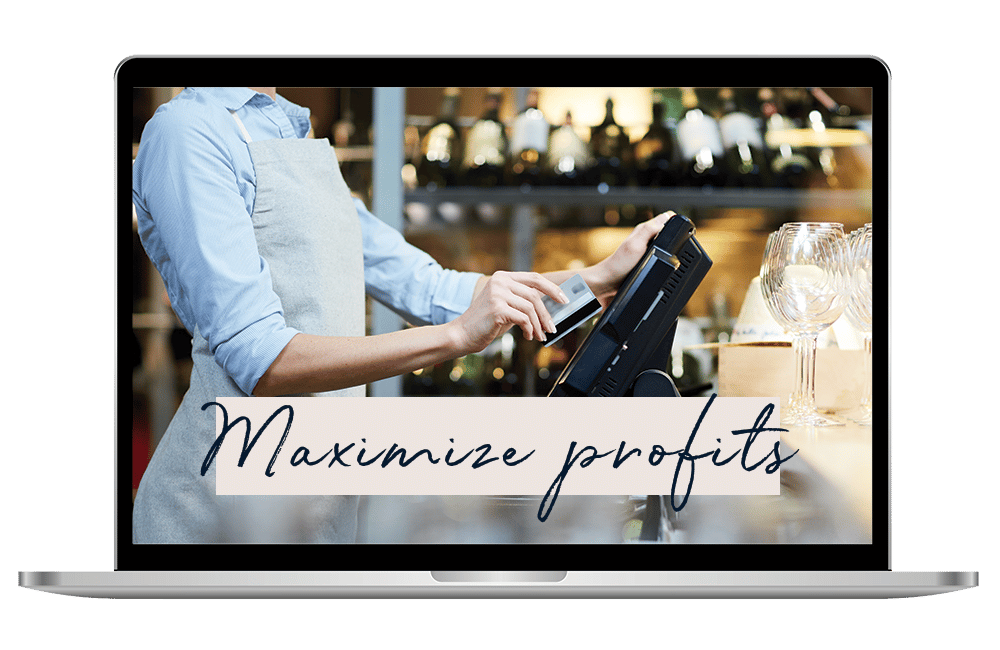
The three costly mistakes you could unknowingly be making?
Find out in this FREE guide and restaurant assessment specifically designed to reveal the unexpected hurdles standing between you and exponential business growth.
Thank You To Our Sponsors
Join your peers at the Show for foodservice in Chicago, May 18-21, and get a taste of the future!
Visit the official Show website and register with promo code PODCAST24 to save $55 off the current registration rate.
Promotional offer expires on May 16. Offer is redeemable through online registration and is only valid for operators. Offer cannot be combined with any other promotion and does not apply to current 2024 show registrants. Non exhibiting suppliers are subject to a higher badge rate.
Increase restaurant sales, optimize guest throughput, and boost customer engagement all on one seamless platform.
Request a demo!
Top equipment brands, extensive inventory, everyday low prices, and 60 years serving independent food service operators.
For a limited time only, popmenu is offering our listeners $100 off your first month plus an unchanging lifetime rate.
Request a DEMO:
Want to become a podcast sponsor?
Please get in touch with Roger at roger@restaurantrockstars.com
